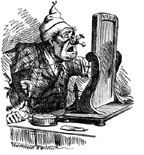
“Markheim.” By Robert Louis Stevenson.
LITERATURE MATTERS
After committing murder for the first time, Markheim, the protagonist in the eponymous short story by Robert Louis Stevenson, is confronted at the scene of his crime by a mysterious “visitant” who seems to be giving him advice on how best to escape being caught. Markheim, a former petty thief, has killed an antiques dealer in cold blood on Christmas Day in order to steal the shopkeeper’s money, which he knows to be hidden away somewhere in the building. His sole objective is to find the money before the shopkeeper’s maidservant returns and finds her master dead in a pool of his own blood. In the midst of Markheim’s search, the visitant, whom Markheim describes as “neither of earth nor of God,” suddenly appears — not to accuse but seemingly to abet. The mysterious visitor even advises Markheim to kill the maidservant upon her return, removing the only obstacle to his plan to steal the shopkeeper’s loot. Although Markheim clearly believes this mysterious visitor is the Devil — after all, he seems to be tempting Markheim to commit further mortal sins — the visitant is actually his guardian angel, using a kind of reverse psychology to set Markheim on an unlikely path to redemption.
Stevenson, who famously explored the concept of the human conscience in the face of evil in his novella The Strange Case of Dr. Jekyll and Mr. Hyde, uses “Markheim” to provide a concise dramatization of the power of repentance. No sin is too great for God to forgive. Although the entire story takes place within the span of an hour, Markheim undergoes a remarkable transformation during this brief time: He walks into the antiques shop a calculating criminal and leaves a repentant sinner. A gambler by vice, the London lowlife has brought 36 years’ worth of sins with him into the shop on this holy day; even before he commits the murder, his conscience is already busy accusing him. When Markheim claims he’s looking to buy his fiancée a Christmas gift, the dealer suggests a 15th-century handheld mirror. “I ask you for a Christmas present, and you give me this,” Markheim snaps at the dealer, “— this damned reminder of years, and sins and follies — this hand conscience!” Clearly, he is not fond of seeing his own reflection. To him, a mirror is not just a mirror but an unwelcome invitation to reflect on a squandered and dissolute life.
As soon as Markheim stabs the dealer with a long, skewer-like dagger, he realizes the entire shop is filled with antique mirrors in which he sees “an army of spies” watching him, accusing him. To add to the mood, all the clocks in the showroom chime together the hour of three in the afternoon — the hour of Christ’s agony — reminding Markheim that he has a limited time to carry out his task of finding the money and leaving the shop before the maidservant returns.
You May Also Enjoy
The expense of maintaining our own illusions of godliness must finally crush our spirits or turn us back to God.
Our relationships with animals have gone wrong. What is tolerable in a few Mrs. Pumphreys is horrifying when it becomes common practice.
Satire plucks a bone from the body of meaning and tradition, and laughs at how ridiculous and useless the bone looks by itself.

